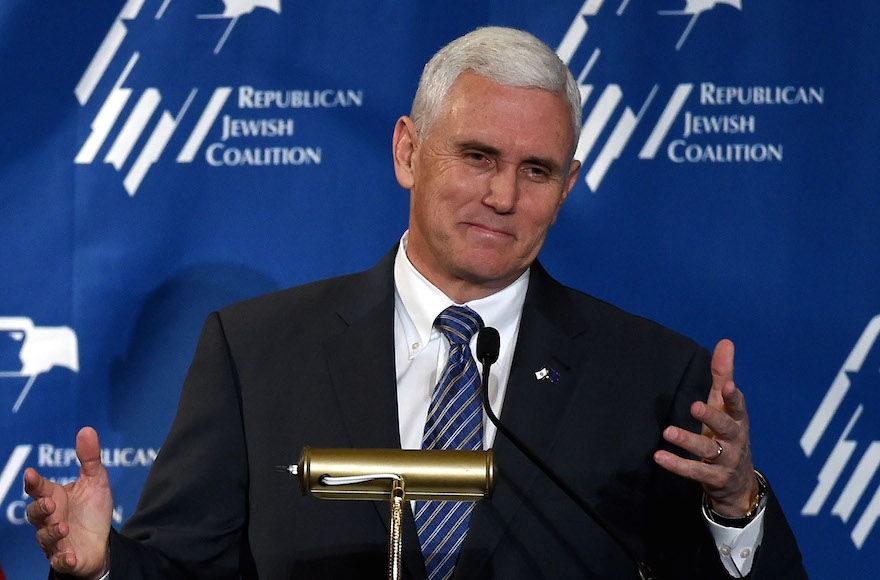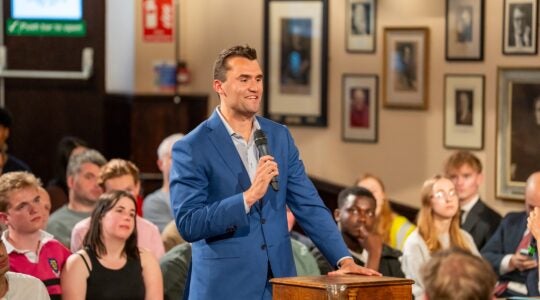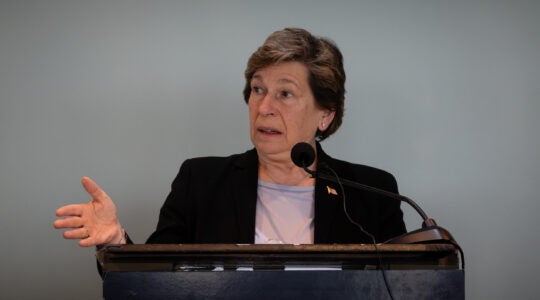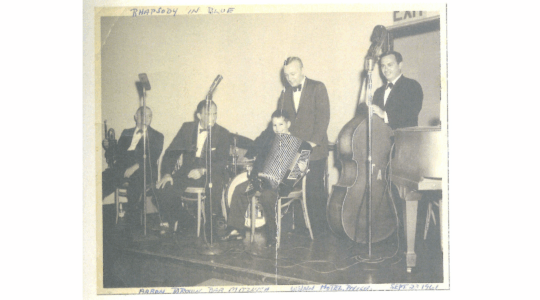
Indiana Gov. Mike Pence speaking at the Republican Jewish Coalition spring leadership meeting in Las Vegas, April 25, 2015. (Ethan Miller/Getty Images)
WASHINGTON (JTA) — Mike Pence, a pro-Israel stalwart, had only one hurdle to clear when he addressed the Republican Jewish Coalition a year or so ago.
Matthew Brooks, the RJC’s executive director, said there were a “lot of questions” at the group’s springtime event about a law the Indiana governor had signed recently allowing businesses to discriminate against LGBT people.
Brooks later felt it necessary to explain to JTA why he had been hard on Pence, who is beloved by Jewish Republicans, at what is otherwise a feel-good celebration of all things GOP.
“There’s no question for us as a party: How do we do better at attracting women and minorities?” he said at the time.
Now it’s 2016 and Donald Trump, who may name Pence his running mate on Friday, has shown how a candidate can capture the nomination trampling over the sensibilities of women, minorities — and Republicans.
The RJC is in retreat at this year’s convention, holding only a couple of closed-media events, and a lot of prominent Jewish Republicans are ducking the assembly, appalled at the broadsides that Trump is still delivering against minorities and the controversy he continues to court.
If Trump picks Pence, though, he may be helping to assuage some Jewish concerns about his nomination.
Pence, 57, a conservative Christian, emerged quickly as a leader on pro-Israel issues during his 12 years in Congress from 2001 to 2013, where he rose rapidly in the GOP caucus leadership, chairing the Republican Conference in his penultimate term, 2011-2013.
He led a number of bids to place conditions on funding for the Palestinian Authority, and in 2007 he joined then-Rep. Ron Klein, D-Fla., in convening the Congressional Anti-Semitism Task Force.
Pence has continued his pro-Israel advocacy as Indiana governor, earlier this year signing one of the most robust state laws targeting the Boycott, Divestment and Sanctions movement against Israel.
He has notably said he dislikes negative campaigning, which may blunt some of the sharp edge of Trump’s rhetoric.
His most notable distinction from Trump may be his willingness to acknowledge when he has erred.
Answering Brooks’ question at the RJC confab, Pence was apologetic. The law went too far he acknowledged, and it was revised.
“Ultimately we adopted a few reforms and made it clear this was a shield, not a sword,” he said.
Pence received warm applause.
If the Indiana governor is announced Friday morning as Trump’s pick as running mate, he will have beaten out two higher profile names — New Jersey Gov. Chris Christie and former House Speaker Newt Gingrich.
If Christie hopes to nail down the vice presidential slot and cash in on his early endorsement of his former rival, his term as the U.S. attorney in New Jersey may come back to haunt him.
Before being elected as a Republican governor in a largely Democratic state, Christie led the successful 2004 prosecution of real estate developer Charles Kushner, the father of Trump son-in-law and close adviser Jared Kushner. The elder Kushner, a major supporter of Jewish causes in New Jersey and beyond, was humiliated over the case, which included his hiring of a prostitute to compromise his brother-in-law in a legal dispute over family control of the real estate business.
Politico reported Thursday that Jared Kusher, who is married to Trump’s daughter Ivanka, was adamantly opposed to including Christie on the ticket because of the zeal with which he prosecuted his father.
As governor, Christie has cultivated close ties with the Jewish community in New Jersey, visiting Israel and signing bills that banned the state from doing business with companies that support the boycott of Israel. He also helped guide $10.6 million to a yeshiva in the heavily haredi Orthodox community of Lakewood — a grant that was later rule unconstitutional.
As a presidential candidate, Christie came out strongly against the deal trading sanctions relief for rollbacks in the Iran nuclear program.
In 2014, Christie stumbled on the campaign trail when he referred to the West Bank as “occupied territories” in addressing the Republican Jewish Coalition. He later apologized to the event’s host, mega-donor Sheldon Adelson, clarifying that his remarks “were not meant to be a statement of policy.”
Christie also took heat from the right – and earned praise from the left — as U.S. attorney for vouching for a Paterson imam who faced deportation for failing to disclose on his green card application a 1993 arrest by Israeli authorities. After the imam was cleared on immigration charges, Christie called the cleric “a man of great goodwill.”
If Trump were to choose Gingrich, a longtime Georgia congressman, they’d be partners in bombastic statements — not least about Israel.
Gingrich, who served as House speaker from 1995 to 1999, called the Palestinians an “invented people” in 2011 during his campaign for the 2012 Republican nomination.
His positions on Israel drew the support of Adelson, a Jewish casino mogul, who reportedly spent $20 million on the Gingrich campaign. During the campaign, Gingrich also recorded a robocall ahead of the Florida primary accusing eventual nominee Mitt Romney of depriving elderly Jews of kosher food while he was governor of Massachusetts.
Gingrich has been hawkish on Israel for decades. In 2007, he blasted President George W. Bush for being too soft on Hamas and called the Middle East peace process a “surrender process.” And as speaker, he pushed President Bill Clinton to sanction companies that provided missile technology to Iran.
He was an architect of the 1995 law mandating the move of the U.S. Embassy to Jerusalem from Tel Aviv, and although it includes a waiver, the law since then has been a thorn in the side of every president. Notably, Yitzhak Rabin, then the prime minister of Israel, opposed the law, saying it would inhibit concluding a peace deal with the Palestinians.
As speaker Gingrich, a Roman Catholic who has been married three times, was an ally of the religious right. In 1997 he sponsored a constitutional amendment to allow prayer in school.
Gingrich also hasn’t been shy in using Nazi imagery to delegitimize opponents. In a 2010 book called “To Save America: Stopping Obama’s Secular-Socialist Machine,” Gingrich described the Obama administration’s policy agenda as “great a threat to America as Nazi Germany and the Soviet Union.” In 2011, Gingrich said the U.S. under Obama is “dominated by a secular, anti-Christian and anti-Jewish elite.”
He opposed a proposed mosque near Ground Zero in Manhattan a year earlier, reasoning that “Nazis don’t have the right to put up a sign next to the Holocaust museum in Washington.”
Gingrich has defended Trump from charges of spreading anti-Semitism. When Trump came under fire for tweeting an image of Hillary Clinton against a backdrop of raining money, with the words “Most Corrupt Candidate Ever!” written on a six-pointed star, Gingrich said the same star was used to advertise the Disney movie “Frozen.”
“Does anybody want to argue that ‘Frozen’ is anti-Semitic?” he asked on CNN.
JTA has documented Jewish history in real-time for over a century. Keep our journalism strong by joining us in supporting independent, award-winning reporting.






